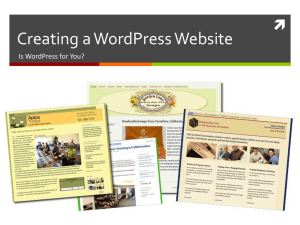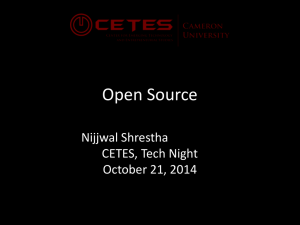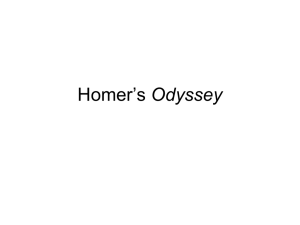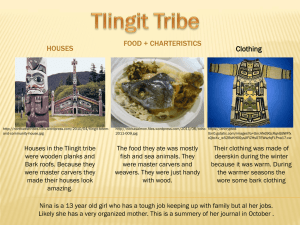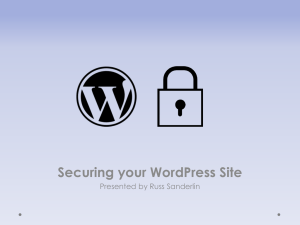CMS-Systems-and-WordPress - seocourse
advertisement
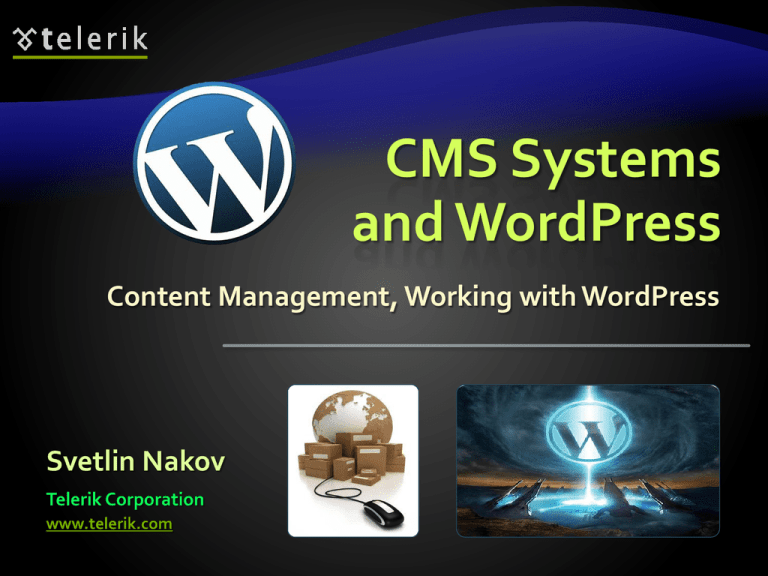
CMS Systems and WordPress Content Management, Working with WordPress Svetlin Nakov Telerik Corporation www.telerik.com Table of Contents Web Content Management Systems (CMS) Joomla, Drupal, WordPress, SharePoint, … Working with WordPress Installing and Configuring Administrative Interface: Pages, Posts, Categories, Tags, Comments, Settings Themes Plugins Creating / Modifying WordPress Themes 2 Web Content Management Systems (CMS Systems) Overview Web CMS Systems Web Content Management Systems (CMS) Software system providing Web site authoring, collaboration and administration tools Users with little or no knowledge of HTML can create and manage Web sites content CMS typical functions: Create / maintain Web sites Add / edit / delete pages, documents, news, images, files, forms, polls, events, blogs, … Manage navigation, users, permissions, SEO, … 4 Benefits of CMS Systems WYSIWYG editor No need for advanced HTML or CSS skills No need for Dreamweaver / FrontPage / etc. or Wiki syntax to learn Can paste content from a word processor Web-based access Edit content from any computer Staff can change content immediately No waiting for Web admin to upload the content Support for many types of documents and files 5 Examples of CMS Systems Open Source CMS Systems Joomla Drupal WordPress DotNetNuke Commercial CMS Systems SharePoint (MOSS) Telerik Sitefinity 6 Web Content Management Systems (CMS Systems) Live Demo WordPress Working with WordPress What is WordPress? WordPress is one of the world's leading blog and Web CMS systems Open-source (free) software Written with PHP and MySQL database Stores all Web site contents in the database and images / files in the file system Very powerful, Easy-to-use, SEO friendly Very large community – themes, plugins, … Official Web site: www.wordpress.org 9 Installing and Running WordPress Installing WordPress In the cloud (use WordPress as service) Just create and account at www.wordpress.com At your Web hosting provider Download it (e.g. wordpress-3.2.1.zip) Unzip it in some public directory at the server Create the database and run the install script Self-hosted Install XAMP + WordPress at your local machine XAMP = Windows + Apache + MySQL + PHP 10 WordPress Dashboard The WordPress Dashboard is: The administrative interface of WordPress Create / edit / delete pages, posts, categories, tags, comments, documents, images, files, … Manage users, themes, widgets, plugins, settings, … User-friendly UI WYSIWYG editor Media library 11 WordPress Themes Using / Creating / Modifying WordPress Themes WordPress Themes WordPress supports themes Themes define the structure, layout (the UI) Can support or not widgets and menus Can be single column / multi-column Can be free or paid The best themes are usually free Users can switch between the installed Official WordPress themes themes directory: http://wordpress.org/extend/themes/ 13 Custom WordPress Themes Typical WordPress themes consist of Main index template – index.php Page template – page.php Header – header.php Footer – foorter.php Sidebar – sidebar.php Comments template – comments.php Styles – styles.css Theme functions – styles.css 14 Using / Creating / Modifying WordPress Themes Live Demo CMS Systems and WordPress Questions?
